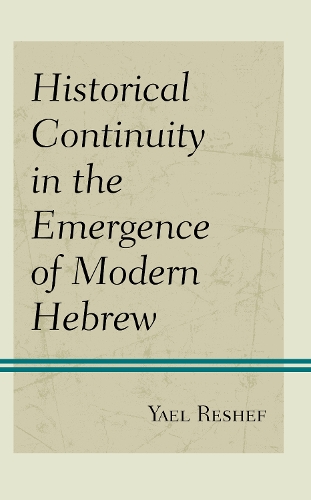
Historical Continuity in the Emergence of Modern Hebrew
(Hardback)
Publishing Details
Historical Continuity in the Emergence of Modern Hebrew
By (Author) Yael Reshef
Bloomsbury Publishing PLC
Lexington Books
13th November 2019
United States
Classifications
Professional and Scholarly
Non Fiction
Social and cultural history
Judaism
History of religion
492.415
Physical Properties
Hardback
150
Width 158mm, Height 232mm, Spine 18mm
408g
Description
Historical Continuity in the Emergence of Modern Hebrew offers a new perspective on the emergence processes of Modern Hebrew and its relationship to earlier forms of Hebrew. Based on a textual examination of select case studies of language use throughout the modernization of Hebrew, this book shows that due to the unconventional sociolinguistic circumstances in the budding speech community, linguistic processes did not necessarily evolve in a linear manner, blurring the distinction between true and apparent historical continuity. The emergent languages standardization involved the restructuring of linguistic habits that had initially taken root among the first speakers, often leading to a retreat from early contact-induced or non-classical phenomena. Yael Reshef demonstrates that as a result, superficial similarity to earlier forms of Hebrew did not necessarily stem from continuity, and deviation from canonical Hebrew features does not necessarily stem from change.
Reviews
This carefully researched, well-documented, and richly illustrated volume adds new and important insights into the puzzling question of the relationship between Modern Hebrew and its classical forebears (Biblical, Rabbinical, and Medieval) as representing change and/or continuity. The book will be of interest to Hebraists, general and Semitic linguists, and typologists, and its contents are accessible both to established scholars and to beginning students in these domains. -- Ruth A. Berman, Tel Aviv University
In the detailed and theoretically-informed empirical studies that make up this book, Yael Reshef takes us beyond the myths, presuppositions, and speculations that characterize most discussions of the emergence of Modern Hebrew. Reshefuncovers how the particular history of Modern Hebrew and its diverse speakers led to surprising, non-linear, and hitherto invisible processes that shaped the language. It will fascinate anyone interested in Hebrew or in language variation and change -- and it made me completely rethink my conceptions of continuity and change in language. -- Eitan Grossman, Hebrew University of Jerusalem
This volume provides a clear and concise overview of the issue of historical continuity as a factor in the emergence of Modern Hebrew. It makes an important contribution to scholarship in its examination of the question of superficial vs. actual continuity between earlier Hebrew sources and the nascent modern language. The work will be of great use to scholars and students seeking to understand the early development of contemporary Hebrew. -- Lily Kahn, University College London
Author Bio
Yael Reshef is professor at the Hebrew University of Jerusalem and a member of the Academy of the Hebrew Language.
